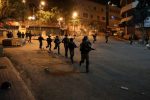Palestinian prisoners – the bulwark of Palestinian resistance – have faced several levels of exclusion and exploitation throughout the decades. Building upon this trajectory US President Donald Trump’s so-called “deal of the century” proposes a humiliating surrender in return for conditional freedom.
It is not just the distortion of resistance which is described as terrorism in the plan to substantiate Israel’s security narrative. The conditions offered to Palestinian prisoners qualifying for release seek to eliminate one important link in the history of Palestinian resistance which is the role of the prisoners in terms of the collective struggle.
The released document makes two suggestions that clearly seek to compromise the Palestinian anti-colonial struggle. Each released prisoner “will be required to sign a pledge to promote within their community the benefits of co-existence between Israelis and Palestinians and to conduct themselves in a manner that models co-existence.” Refusal to sign the pledge will of course impede the prisoner’s release.
The other clause which is equally damaging given the conditions of the deal states “Each prisoner who is released shall have the right to seek asylum in a third country.”
One important point to remember is that the US plan removes all context of Israel’s colonial violence thus spreading misinformation about the Palestinian prisoners’ struggle in this case. The deal itself does not seek to rectify any form of Israeli violations; it sets out the plan to intensify what so far has been achieved through Israeli belligerence and international acquiescence. By targeting Palestinian prisoners with such clauses masquerading as purported opportunities the US is merely giving Israel the green light for ongoing colonization.
Palestinian prisoners have served a cause that cannot be tarnished by the colonial version of purported coexistence. Israel promotes and accomplishes forced displacement and the creation of Palestinian refugees not coexistence. Why does the burden suddenly fall upon Palestinian prisoners to promote a non-existent framework in their communities which will likely be targeted as Israel expands further over Palestinian land?
Furthermore the option to seek asylum after decades of Palestinians facing severe restrictions when it comes to freedom of movement is a ploy to fragment Palestinian resilience even further. In this case Israel is exploiting the right to asylum and Palestinians’ deprivation of basic necessities to encourage the indigenous population to transfer itself. As survival becomes a priority resistance suffers. Israel is aware of the dynamic; hence the US is seeking to facilitate options that would make Israel’s land grab even more accessible.
Breaking up the Palestinian prisoners’ role along with the elimination of the Palestinian right of return paves the way for Israel to clear the rest of Palestine from Palestinians using the same tactics but this time through seeking Palestinian approval. The latter of course will not happen – Palestinians are committed to their land and their rights. However Palestinian resistance finds itself in a different predicament now – countering a fragmentation which the international community will not oppose despite the violations of human rights involved in the process.
– Ramona Wadi is an independent researcher freelance journalist book reviewer and blogger. Her writing covers a range of themes in relation to Palestine Chile and Latin America. Her article appeared in MEMO.












